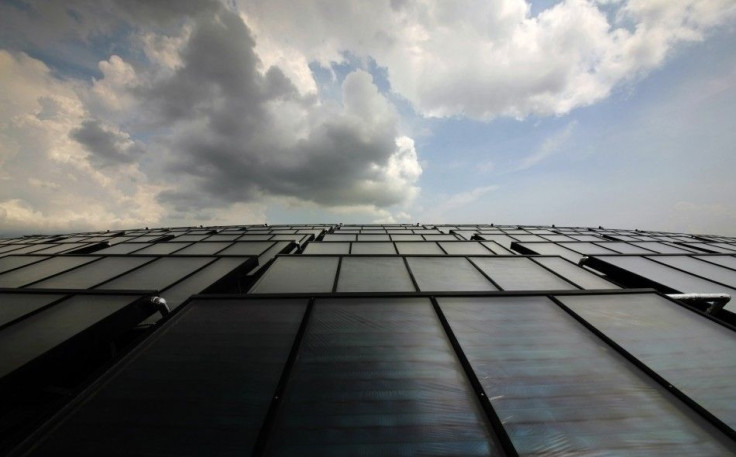US Solar Energy Industry Under Threat From Coronavirus As Projects Delayed, Jobs Put At Risk

KEY POINTS
- Solar energy employs about 250,000 people in US
- Solar companies are facing supply disruptions, project delays
- Solar accounted for 40% of all new electric generating capacity in the U.S. in last year
The $2 trillion coronavirus relief bill that the U.S. Senate and House both passed contains no specific provisions related to the nation’s beleaguered solar energy industry.
The Solar Energy Industries Association, or SEIA, warned the industry is at grave risk due to the coronavirus pandemic.
“Solar companies and workers are losing business and being put out of work by COVID-19,” said Abigail Ross Hopper, president and CEO of SEIA. "As a result of this pandemic, the solar industry stands to lose half of our jobs -- that’s 125,000 families who will no longer receive a paycheck.”
Now, since the arrival of the pandemic, she noted some solar firms are already cutting workforce.
“More than 75% of solar companies have fewer than 50 employees,” she added. “These small businesses represent the backbone of the American economy, and the concerns they’ve voiced to us are troublesome.”
Due to disruptions caused by the virus, solar companies are facing construction delays, supply chain and equipment delays, and permitting delays. In addition, residents are increasingly cancelling plans to install solar systems, while big box stores curtail or eliminate solar projects.
“One company today told us they have already seen a 60% drop in sales,” Hopper noted. “Companies are reporting complete work stoppage and sales lost for six months to a year. One company with 350 employees completely shut down this week. Orders for shipments are being cancelled left and right, hurting manufacturers. Companies are reporting 90- to 130-day delays for products.”
Additionally, as the stock market tanks, tax-equity markets are drying up making it even harder for solar companies to use things like the solar investment tax credit, Hopper said.
The $20 billion in investment that was anticipated in 2020 from the solar industry is now under threat, SEIA added.
Solar companies face strict deadlines for claiming the tax credits passed by Congress several years ago. Since the pandemic will obviously delay many new solar projects, if Congress does not extend those credits, solar firms cannot use them.
“We do not need a bailout,” said Sheldon Kimber, chief executive of solar developer Intersect Power, which is starting construction of five projects in California and Texas this year. Kimber said the solar industry only needs “a handful of definitive tweaks to the tax credits we already get.”
For example, 8minute Solar Energy of El Centro, Calif., stopped work on its 50-megawatt Lotus solar farm in California last week after Gov. Gavin Newsom asked residents to stay at home. About 50 people worked on that project.
Now the company is worried about its ability to obtain financing for new projects as it tries to meet tax credit deadlines.
“If that ability to monetize the tax credit goes away, you have gigawatts and gigawatts of projects that were supposed to be built over the next two to three years that are [now] very much in jeopardy,” said Josh Goldstein, chief operating officer.
Hopper conceded that some elements of the $2 trillion stimulus bill will help solar businesses and solar workers, including long-term unemployment insurance, business loans and provisions that protect employee retention.
However, the bill lacks such things as tax credit extensions and direct pay provisions that solar companies had been seeking.
Gregory Wetstone, CEO of the American Council on Renewable Energy, said the focus now is on future federal legislation
“When lawmakers turn their attention to measures aimed at bolstering specific sectors of the economy adversely impacted by the coronavirus, we want to make sure they understand how supply-chain disruptions and other pandemic-related delays are threatening the jobs of hundreds of thousands of workers in the renewable sector and the time-sensitive tax incentives on which renewable project financing depends," Wetstone said.
But Keith Martin, an attorney who specializes in wind and solar financing deals for Norton Rose Fulbright, told Bloomberg that the renewable energy industry hasn’t been as badly damaged by the pandemic as airlines, hotels and other industries who sought bailouts from the government.
Prior to the pandemic, the U.S. solar industry was expecting a year of major growth and advancements.
Solar accounted for 40% of all new electric generating capacity in the U.S. in last year, its highest figure ever.
SEIA said that the U.S. solar market grew 23% year-over-year in 2019, despite higher tariffs on some solar components.
© Copyright IBTimes 2024. All rights reserved.




















